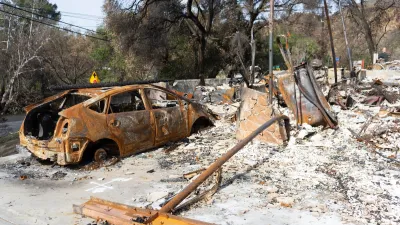Scientists are studying whether the stresses of living in urban environments increases the risks of developing mental health disorders. Global urbanization is making the question an urgent one, writes Alison Abbott.
While anecdotal evidence of the mental health impacts of noisy neighbors, crowded streets, and higher crime rates associated with urban living may be evident, the impact of such stresses on the brain have not been rigorously tested. "Now," reports Abbott, "a few scientists are tackling the question head on, using
functional brain imaging and digital monitoring to see how people living
in cities and rural areas differ in the way that their brains process
stressful situations."
"'Yes, city-stress is a big, messy concept, but I
believed it should be possible to at least see if brains of
city-dwellers looked somehow different,' says Andreas Meyer-Lindenberg,
director of the Central Institute for Mental Health in Mannheim,
Germany. "And if scientists can work out what aspects of the city are the
most stressful," says Abbott, "the findings might even help to improve the design of
urban areas."
"'Everyone wants the city to be beautiful but no-one knows
what that means,' says Meyer-Lindenberg. Wider streets? Taller
buildings? More trees? 'Architects theorize a lot, but this type of
project could deliver a scientific basis for a city code.'"
FULL STORY: Stress and the city: Urban decay

Planetizen Federal Action Tracker
A weekly monitor of how Trump’s orders and actions are impacting planners and planning in America.

Chicago’s Ghost Rails
Just beneath the surface of the modern city lie the remnants of its expansive early 20th-century streetcar system.

San Antonio and Austin are Fusing Into one Massive Megaregion
The region spanning the two central Texas cities is growing fast, posing challenges for local infrastructure and water supplies.

Since Zion's Shuttles Went Electric “The Smog is Gone”
Visitors to Zion National Park can enjoy the canyon via the nation’s first fully electric park shuttle system.

Trump Distributing DOT Safety Funds at 1/10 Rate of Biden
Funds for Safe Streets and other transportation safety and equity programs are being held up by administrative reviews and conflicts with the Trump administration’s priorities.

German Cities Subsidize Taxis for Women Amid Wave of Violence
Free or low-cost taxi rides can help women navigate cities more safely, but critics say the programs don't address the root causes of violence against women.
Urban Design for Planners 1: Software Tools
This six-course series explores essential urban design concepts using open source software and equips planners with the tools they need to participate fully in the urban design process.
Planning for Universal Design
Learn the tools for implementing Universal Design in planning regulations.
planning NEXT
Appalachian Highlands Housing Partners
Mpact (founded as Rail~Volution)
City of Camden Redevelopment Agency
City of Astoria
City of Portland
City of Laramie





























